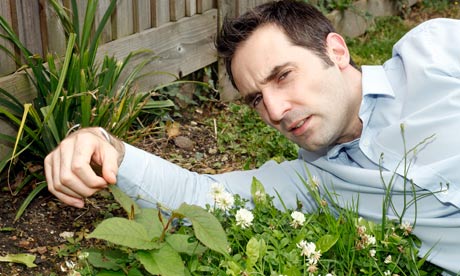Two weeks before he was due to exchange contracts and move into a new home, Peter Gingell received a call from his estate agent saying the whole thing was off. His buyers had pulled out, his chain had collapsed and his dream home was just that. The reason? A 3cm-high weed in his back garden.
"When I was told, I thought it was a joke," says Gingell.
However, this wasn't just any old weed; it was Japanese knotweed, described by the Environment Agency as "indisputably the UK's most aggressive, destructive and invasive plant".
It can grow to 3-4m in just 10 weeks – the equivalent of two grown adults. Underground, its roots – or rhizomes – can spread 7m horizontally and compromise the structure of buildings.
Jonathan Harris, director of mortgage broker Anderson Harris, acknowledges that the problem of securing mortgages on properties affected by the plant has escalated in recent years, despite the fact that it has been around in the UK since the 19th century.
"If a bank's valuer finds evidence of it, or there is a history of it in the area, a specialist survey will be required. Lenders can get quite hysterical and over-react. The bank may not lend, or may retain part of the loan."
Mark Harris, chief executive of broker SPF Private Clients, says: "It's a mixed bag. Woolwich, Santander and Leeds Building Society will decline mortgage applications on properties where Japanese knotweed is present, while others will consider it, with guarantees or an indemnity in place, and be guided by a surveyor, such as Northern Rock, Clydesdale and Nationwide."
Yet, according to Richard Sexton, business development director of e.surv: "No house in the UK has fallen down because of knotweed. Yes, it grows like billio and can exploit holes and cracks but there's an element of scare stories that has made the banks panic over the past two to three years. It's not that it's suddenly spreading more, but as awareness has risen, valuers report it more."
He acknowledges a "lack of clarity", with some lenders wanting to know not just whether it's in the garden, but whether it's in the street or even the town. Lenders, he says, have panicked and, coupled with the economic climate, "gone into risk-averse mode".
Soon after his buyer pulled out, Gingell carried out his own research and soon realised there are varying degrees of severity, in particular its proximity to properties. Although it's not easy, it can be treated. "It seems so unfair that a lender has a blanket policy of saying 'no'. It's treatable, but they have rendered my property worthless overnight."
He called in a specialist (it took both of them 20 minutes, on their hands and knees, to even locate the specimen) who reported: "In my opinion, the knotweed offers no threat to the building or its foundations and, provided it is treated before it has a chance to spread further, it should be eradicated within two years."
Gingell has been quoted £300 per treatment, carried out twice a year for the next two years. He warns against what was his initial temptation – ripping it out and binning it: "You can face a massive fine or even imprisonment if it isn't disposed of at a landfill site, or incinerated. And if you don't do it properly, it will definitely come back." A fingernail-sized fragment is enough to grow into a whole new plant.
Having lost his savings and, faced with a currently un-mortgageable flat, Gingell is keen to raise awareness of the issue, given estimates show at least one infestation in every 10 sq kms in the UK. He has launched a campaign on his website knotaware.com urging banks to change their lending policy and adopt a grading system rather than simply saying no.
The future looks more positive after a working party, including lenders, surveyors and knotweed treatment companies produced an information paper for the Royal Institution of Chartered Surveyors (RICS). It has the backing of the Council of Mortgage Lenders and the Building Societies Association.
"It's the first step towards proper guidance for the market," says Philip Santo, director of Philip Santo and Company, which produced the paper on behalf of the RCIS in a bid "to make properties mortgageable again".
Importantly, it sets out to distinguish myth from reality and addresses the need for surveyors to have a tier system to indicate the level of risk. It also looks at how the growing number of treatment companies could agree on the best methods of working.
The Property Care Association now audits these firms and provides training.
Mortgage advisers and surveyors admit it will probably take at least until the end of the year before the guidelines become more widely adopted. Santo says: "It is early days in terms of all the banks coming on board, but if a lender declines an application, I strongly recommend people challenge them to see if the policy reflects the changes and recognised treatment regime set out in the RICS paper. I know of two cases where people have gone back and had the decision modified."
The lowdown on knotweed law
The Environment Agency describes Japanese knotweed as the most invasive species of plant in Britain. Landowners are under a statutory duty to be proactive in the control and eradication of it. All parts of the plant and any soil contaminated with it are classified as controlled waste and must be removed and disposed of by a licensed waste control operator. Here, Chris Alexander, a property litigation lawyer at SA Law outlines your legal rights:
• If you have Japanese knotweed on your land:
It is not an offence to have Japanese knotweed on your land and it is not a notifiable weed. However, under Section 14(1) and (2), of the Wildlife and Countryside Act 1981 it is a criminal offence to plant Japanese knotweed or otherwise cause it to grow in the wild.
It is a defence to a prosecution to prove that all reasonable steps were taken and all due diligence was exercised by the landowner.
The removal, eradication and disposal of the weed may be expensive but given that the presence of it can impede the sale of your property and/or affect the value, a least-risk approach would be to have it removed by licensed contractors and properly disposed of.
• If your neighbour has Japanese knotweed on their land:
Again, it is not an offence for Japanese knotweed to be present on your neighbour's land but allowing it to encroach onto your property may constitute a private nuisance under common law.
A landowner affected by knotweed growth from a neighbouring property may therefore be able to apply to court for an injunction requiring the neighbouring owner to abate the nuisance. Such a claim can also include a sum of money in damages to reflect the cost of any physical damage to the property and/or the diminution in value of the landowner's property as a result of the nuisance.
• For information on the RICS Japanese knotweed and Residential Property paper go to rics.org.uk. A list of approved treatment firms are at property-care.org








